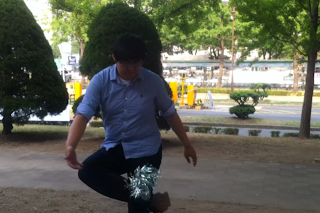The reason why we choose this project
1. Korean university students' playing is very limited.
When the university students meet each other to play, things to do is almost fixed. Drinking alchohol, playing game in internet cafe, and singing in Noraebang etc. Getting out of normal university students' play, we want to change our playing custom. So, we can expect that traditional plays give us new way to fun and be able to experience our view of variety of play. Playing Korean traditional plays is also learning our past people's life. In the past people's plays, we broaden view of life.
2. Lightness+Creativity
South Korea is the fastest-grown performance society. However, that growth don't last by far, due to lack of creativity. We can make iPhone more better and develop. But we cannot make iPhone first without creativity. Likewise, in a study, we cannot win a Nobel Prize without creativity. Because Nobel Prize is given to the people who firstly think about new concept or new idea. So we need creativity. But, in order to flourish creativity, we have to change our societal situation which is formal and heavy. Creativity comes out from happy and light environment. Therefore we decide that our 10 Day- Challenge is playing Korea traditional plays.
Our Activity
6/2/2012
Kong-gi nol-i(Play five-stones jackrocks)
Kong-gi nol-i is a popular Korean children's game that is traditionally played using 5 or more small grape-sized pebbles. Nowadays, children buy colourful plastic stones instead of finding pebbles. It can be played alone or with friends. The stones are called konggitdol, which means "gonggi stones." Since only a few stones and a flat surface are needed for play, the game can be played by anyone almost anywhere.
6/3/2012
Ddak-ji chi-gi(Game of slap match)
Ddak-ji is a sort of Korean traditional folded toy made of paper. Ddak-ji chi-gi is used by Ddak-ji. the opponent lay Ddak-ji on the ground. I hit opponent's Ddak-ji by one's own Ddak-ji. I turn it over opponent's Ddak-ji and win.
6/4/2012
Pang-i chi-gi(Play Korean top)
A top is a toy that can be spun on an axis, balancing on a point. This motion is lasted by hitting the bottom of the top. And compare whose top is spun more time.
6/5/2012
Mugunghwa kkot-i pi-ut-sep-ni-da
Mugunghwa kkot-i pi-ut-sep-ni-da is a applied hide and seek. Tagger says “Mugunghwa kkot-i pi-ut-sep-ni-da.” ,looking the wall. Tagger finishes the saying as soon as turns around. If somebody moves at that time, tagger catch it.
6/6/2012
Yon nal-li-gi(Play kite)
Yon nal-li-gi is a popular Korean game. This game uses rectangle kites and it typically played on the holiday Seollal.
6/7/2012
Mal-dduk bak-ki
Mal-dduk bak-ki need two teams. There is one standing man. And one team bend down standing man. The other team get on bending men's back. When the other team all get on the men's back, the standing man and the other team's first rider do rock-paper-scissor. When the other team lose, position will be changed. If not, stay the position.
6/8/2012
Ddang dda-muk-ki(Play the ground of conquer)
Draw 8 boxes on the ground. It consists of two rectangular squares, big square divided into 4 boxes by diagonal line above two rectangular squares. After finishing the drawing, throw the stone into each box in sequence. Avoid the box thrown by stone and step the rest boxes in sequence.
6/9/2012
Yoot nol-i
Yoot nol-i (sometimes romanized as nyout or yoot) is a traditional board game played in Korea, especially during Korean New Year. The game is also called cheok-sa or sa-hee. The combining-form -nori means 'game'.
6/10/2012
Kang-kang-su-wol-lae
Kang-kang-su-wol-lae just grouping with several people. And grab each other's hand. And go around. When the moon is full, it is played by people.
6/11/2012
Je-ki cha-gi
Je-ki cha-gi is a Korean traditional outdoor game. It requires the use of people's foot and Jegi, an object used to play jegichagi.
Activity Video
After Activity...
Unexpectedly, Korean traditional plays are fun. I move around much after a long time. If I have a chance to do Korean traditional plays more, I definitely do it. We have a misconception about Korean traditional plays.
Also they remind me of my old memories. In elementary school's winter time, I used to go outside for kite. Like the movie 'The Kite Runner', I ran in the school's ground until the sunset. And we go to the Chang-Chun elementary school. The reason we go there is that we have to buy a lot of items which we need in the plays. There is one small stationery store filled with old play item. In that store, I feel like in the other world detached from right-now reality. We can find whole item we needed. For example DDak-Ji, Korean traditional top, Yoot. DDak-Ji we find was the one used to play in my elementary school. That really reminds me of my old time. I collected money from my pocket money. The money was used in buying DDak-Ji. When I had a new DDak-Ji, I hurried to play the game with my friends. I am so glad that I feel like in the middle of my elementary school's time.
And we created the video about our playing. We recorded and produced it together. That production-process is really new and meaningful to me.
These things make me tired during the time that we are doing the whole process. But it is worthy of being tired.
What are we change?
We know the pleasure of plays through this activity. We usually consider consequential results as being more important than minor pleasures. But as this activity makes our life so fun and vigorous, light pleasures have a big impact to happiness of our life. This activity can have a meaning that it is one of efforts which make our society has a interest for light pleasures we knew at this activity. We hope this activity gives a vitality to our society which is a performance-oriented society.





.jpg)

.jpg)


댓글 없음:
댓글 쓰기